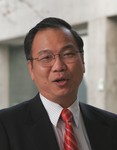Wing Thye Woo
Contributions to Fondad publications
- 2006 Global Imbalances and the US Debt Problem: Should Developing Countries Support the US Dollar?
- 2005 Africa in the World Economy: The National, Regional and International Challenges
- 2004 Diversity in Development: Reconsidering the Washington Consensus
- 2003 China's Role in Asia and the World Economy: Fostering Stability and Growth

Wing Thye Woo is Professor in the Department of Economics, University of California at Davis. He is also Senior Fellow in the Global Economy and Development Program and the Foreign Policy Studies Program at Brookings Institution, and the Director of the East Asia Program within the Center for Globalisation and Sustainable Development at Columbia University. His current research focuses on the economic issues of East Asia (particularly, China and Indonesia), international financial architecture, economic growth, and exchange rate economics.
He has published over 100 articles in professional economic journals and books on these topics. His article "The Monetary Approach to Exchange Rate Determination under Rational Expectations: The Dollar-Deutschemark Case," Journal of International Economics (JIE) , February 1985, was identified by JIE in 2000 to be one of the twenty-five most cited articles in its 30 years of history.
From 1994-96, Wing Thye Woo led an international team (which included Leszek Balcerowicz, Boris Fedorov, and Jeffrey D. Sachs) to study the reform experiences of centrally-planned economies. This report was published by MIT Press as Economies in Transition: Comparing Asia and Europe, 1997.
In 1998, Wing Thye Woo headed the project “Asia Competitiveness Report 1999” to analyse the Asian financial crisis for the annual meeting of the World Economic Forum in Davos, Switzerland, February 1999. The updated report was published as The Asian Financial Crisis: Lessons for a Resilient Asia, MIT Press, 2000. In 2001, Wing Thye Woo helped establish the Asian Economic Panel (AEP), now sponsored by Columbia University, Keio University, and the Korea Institute for International Economic Policy. AEP is a forum of about 50 leading specialists on Asian economies which meets twice a year to discuss economic issues that are of particular importance to Asia. Selected papers from the meetings are published in the new journal Asian Economic Papers (of which Wing Thye Woo is the editor), MIT Press.Wing Thye Woo has advised a number of governments on macroeconomic and exchange rate management, state enterprise restructuring, trade issues, and financial sector development. He was a member of Consultant Team to China's Ministry of Finance that helped to design the tax and exchange rate reforms implemented in January 1994; the report has been published by Oxford University Press as Fiscal Management and Economic Reform in the People's Republic of China, 1995.
During 1997-1998, Wing Thye Woo served as a special advisor to the U.S. Treasury; duties included accompanying Secretary Robert Rubin to meetings in China, and to the IMF-World Bank annual meeting in Hong Kong. From 2002-2005, he was the Special Advisor for East Asian Economies in the Millennium Project of the United Nations. In July 2005, he was appointed to the International Advisory Panel to the Prime Minister of Malaysia.
In 2004, the University of California at Davis awarded Wing Thye Woo its Distinguished Scholarly Public Service Award, and the Institute of Strategic and International Studies in Malaysia appointed him a Distinguished ISIS Fellow. In November 2004, he delivered the Chang Chi Ming Cambridge Public Lecture on Chinese Economy at the University of Cambridge. In March 2006, he was appointed a Chang Jiang Scholar (by the Ministry of Education of China based on nation-wide competition among universities) at the Central University of Finance and Economics in Beijing, China.Wing Thye Woo was born in 1954 in Penang, Malaysia. He graduated from Swarthmore College in 1976 with a B.A. (High Honors) in Economics, and a B.S. in Engineering; received an M.A. in Economics from Yale in 1978, and an M.A. and a Ph.D. in Economics from Harvard in 1982.









